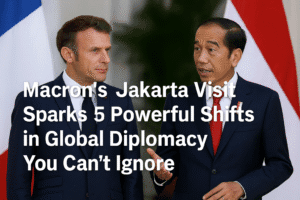Macron’s Jakarta Visit Sparks 5 Powerful Shifts in Global Diplomacy You Can’t Ignore
French President Macron’s visit to Jakarta forged a significant strategic partnership with Indonesia, yielding concrete defense and economic agreements while advancing surprising diplomacy on Israel-Palestine. Crucially, Indonesian President Prabowo pledged conditional recognition of Israel—a major shift for the world’s largest Muslim-majority nation—contingent on Israel recognizing Palestinian statehood. This leverages Indonesia’s moral weight to pressure progress toward a two-state solution.
Simultaneously, France and Indonesia condemned Israeli actions in Gaza and committed to driving mutual recognition efforts at an upcoming UN conference. Beyond Palestine, Macron deepened trade, defense (including Rafale jets and submarines), and critical mineral ties, actively positioning France as a “balancing power” between the US and China in Southeast Asia. The visit highlights Indonesia’s rising influence and Macron’s ambition to build coalitions offering alternatives to superpower dominance, making tangible his vision of a rules-based “third way” in global politics.

Macron’s Jakarta Visit Sparks 5 Powerful Shifts in Global Diplomacy You Can’t Ignore
French President Emmanuel Macron’s visit to Jakarta wasn’t just another diplomatic stopover; it became a stage for significant geopolitical maneuvering and unexpected signals, particularly regarding the intractable Israeli-Palestinian conflict. Here’s the deeper significance:
- Indonesia’s Conditional Recognition: A Diplomatic Gambit
- The Pledge: President Prabowo Subianto’s statement – offering formal recognition of Israel if it recognizes an independent Palestinian state – is a major shift. Indonesia, the world’s largest Muslim-majority nation, has historically had no diplomatic ties with Israel. This conditional offer leverages Indonesia’s symbolic weight to pressure Israel towards the two-state solution.
- The Strategy: It aligns Indonesia with France’s stated goal of triggering a movement for Palestinian statehood based on mutual recognition. Prabowo framed it as acknowledging Israel’s rights to sovereignty and security, making the offer harder for Israel to dismiss outright. It positions Indonesia as a potential bridge-builder.
- France & Indonesia: Forging a “Third Way” Partnership
- Beyond Palestine: The visit solidified a strategic partnership. Macron explicitly seeks France as a “balancing power” between US-China competition. Southeast Asia, and Indonesia specifically, is crucial for this.
- Concrete Outcomes: Signed agreements spanned defense (intent for more Rafale jets, frigates, submarines, artillery), critical minerals (nickel exploration with Indonesia’s sovereign wealth funds), agriculture, disaster management, and culture. This moves beyond rhetoric to tangible economic and security cooperation.
- Shared Vision: The joint condemnation of Israeli control over Gaza and population displacement, coupled with the call for a “credible roadmap” at the upcoming France-Saudi UN conference, shows aligned diplomatic priorities beyond just trade.
- Macron’s Balancing Act: Principles and Pragmatism
- The “Power of Peace & Balance”: Macron’s messaging in Vietnam and Indonesia consistently emphasized an international order “based on law” – a subtle critique of both Chinese assertiveness (South China Sea) and US protectionism/tariff threats under Trump. He positioned France as a stabilizing alternative.
- Conditions for Palestine: Macron reiterated France’s support for Palestinian statehood but linked it to crucial conditions: Hamas demilitarization and clear recognition of Israel’s right to exist and self-defense. This reflects the complex reality of achieving peace.
- Economic Realism: While promoting principles, Macron aggressively pursued contracts for French firms in defense and critical minerals (like nickel for EV batteries), recognizing Indonesia’s economic importance.
The Takeaway: Why This Matters
Macron’s Jakarta visit underscores several key trends:
- Diplomatic Creativity on Palestine: Indonesia’s conditional recognition offer is a novel tactic injecting new energy into a stagnant process. It demonstrates Muslim-majority nations seeking proactive roles beyond condemnation.
- The Rise of Middle Powers: Indonesia is asserting its influence. France recognizes this, not just seeking markets, but building a strategic partnership with a key regional player capable of shaping narratives.
- France’s Global Ambition: Macron is actively constructing a coalition of nations wary of bipolar US-China dominance. Deepening ties with major Southeast Asian economies like Indonesia and Vietnam is central to this “third way” strategy.
- Intertwined Diplomacy: Security deals, economic partnerships, and high-stakes diplomacy (like the Israel-Palestine issue) are increasingly interconnected. Progress on one front can influence others.
The success of this Franco-Indonesian alignment hinges on tangible outcomes. Can their mutual recognition push gain traction before the UN conference? Will the defense and mineral deals materialize significantly? And crucially, can Macron’s vision of a rules-based “third way” attract broader support in a world facing fragmentation? Macron’s Jakarta stop wasn’t just about agreements signed; it revealed the complex, multi-layered chessboard of 21st-century global politics, where middle powers like Indonesia are becoming indispensable players.
You must be logged in to post a comment.